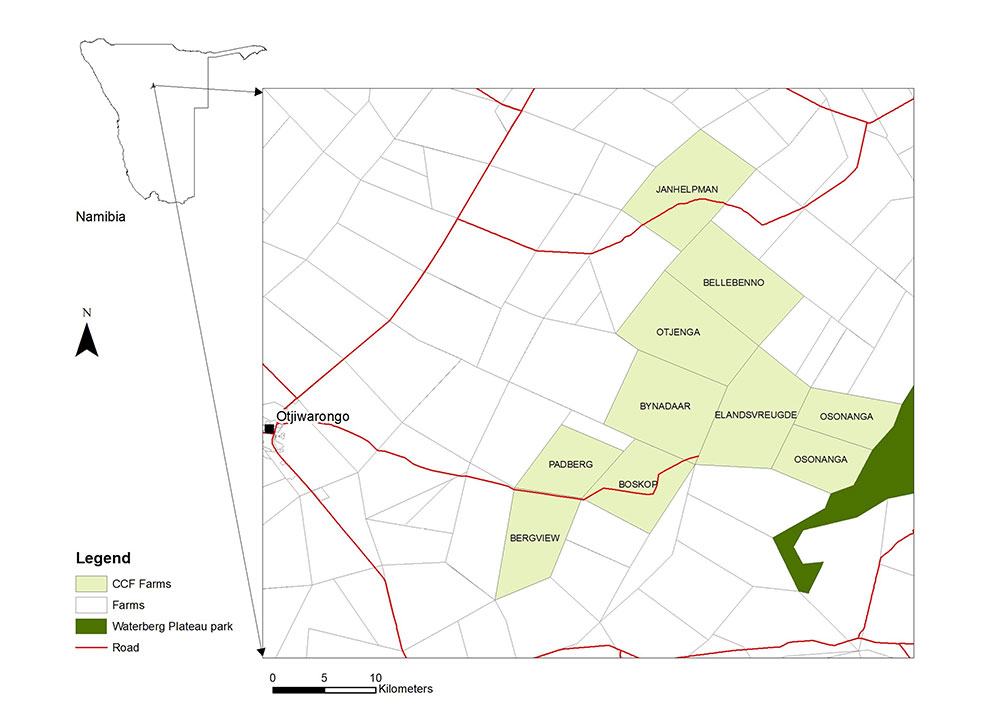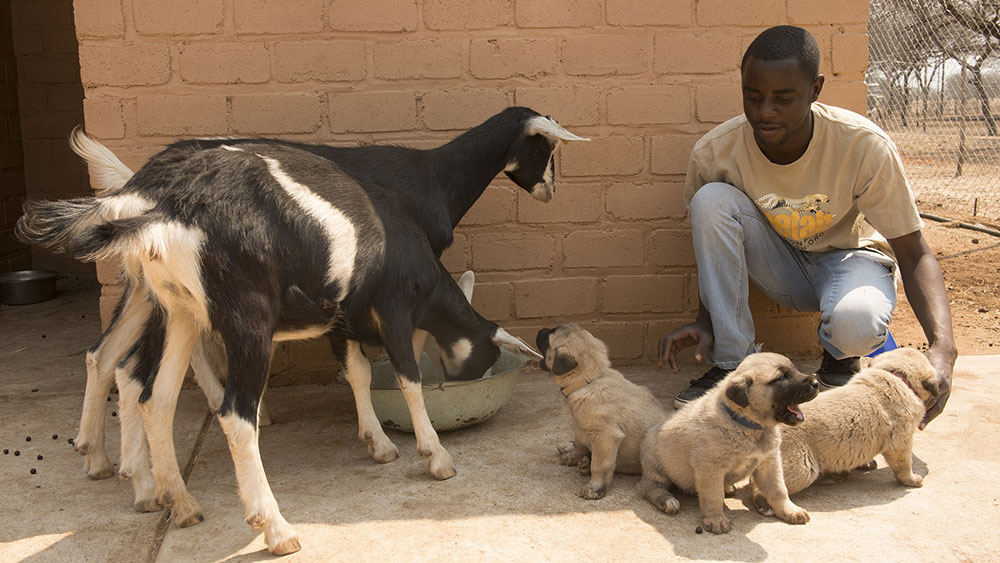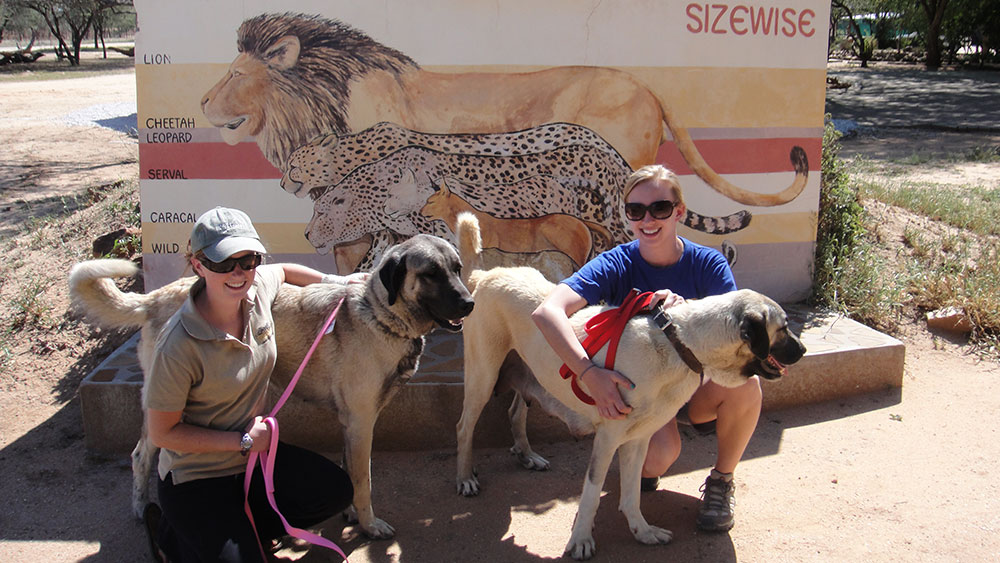CCF BUSHBLOK® Woodland Management Plan (WMP)
Namibia has the world’s largest population of cheetahs, with 90% living outside protected reserves on farmlands. Thus, Namibian farmers (ranchers) are important stakeholders in cheetah conservation. Because of unpredictable droughts and injudicious livestock farming practices, bush species are encroaching Namibian farmlands. The Namibian livestock industry revenue has been affected negatively because of bush encroachment (de Klerk, 2004). Since the 1960’s, the number of livestock units (LSU) declined from 1 LSU/10 hectares (ha) to 1 LSU/20 ha or 30 ha (de Klerk, 2004). The loss of rangeland productivity costs Namibia an estimated annual revenue of N$ 700 million, and affects about 65 000 households (de Klerk, 2004). The Cheetah Conservation Fund (CCF) aims to support a biomass industry that will restore the rangelands through sustainable harvest. This will improve the farmlands economy and thus the farmer’s tolerance for cheetah.
The CCF Woodland Management Plan (WMP) provides a management framework for the biomass operations of the Cheetah Conservation Fund. It promotes Namibia’s vision 2030 through the sustainable utilization and management of natural resources in accordance with the Forest act 2001, and the Namibia forest development policy of 1998.
The plan considers methods of harvesting, suggests harvesting targets, monitoring programs (ecologic, & socio-economic), and land use objectives. By selecting monitoring targets, a business subjected to adaptive management conditions can be developed. Policies related to the WMP (harvesting, fire, land use objectives, permits) were developed as control measures to prevent counterproductive activities, and ensure that harvesting is conducted in accordance with the expectations of the Cheetah Conservation Fund.
In 2001, CCF and the United States Agency for International Development (USAID) collaborated to find a habitat improvement program in Namibia that would be ecologically and economically viable. Research identified a business opportunity to process encroaching bush into compacted logs for use as a cooking fuel or for home heating. CCF Bush PTY Ltd was established to manufacture the BUSHBLOK® product, an extruded wood briquette. CCF BUSH Pty Ltd is an independent for-profit organization which operates under its own management. The Cheetah Conservation Fund (CCF) is the sole owner of all the shares in CCF Bush PTY Ltd. CCF BUSH Pty Ltd manages all activities at the Biomass Technology Demonstration Center (BTDC).

CCF's Mission
To be an internationally recognized centre of excellence in research and education on cheetahs and their ecosystems, working with all stakeholders to achieve best practice in the conservation and management of the world’s cheetahs.
Ownership and Management
Cheetah Conservation Fund (CCF) is the owner of CCF Bush Pty Ltd.
CCF’s base of operations is in Namibia, which has the largest and one of the few sustainable populations of free-ranging cheetahs in the world. The cheetah’s survival depends on a total ecological system of farmland management, prey species management, and habitat stability.
CCF’s Namibia focus is to work with livestock farming communities in order to develop ways to reduce conflict. This is achieved by devising a conservation plan that secures habitat for the species, while still accommodating farmers’ land use needs. CCF carries out scientific research programs in areas such as cheetah population biology, cheetah ecology, cheetah health and reproduction, and human impacts on the cheetah. CCF researchers develop, test, and promote alternative land-management practices such as conservancy development, non-lethal predator control, relocation of problem cheetahs, and eco-tourism.
Additionally, CCF conducts both Namibian and international education programs to raise awareness of the cheetah’s endangered status. These illustrate ways in which the species can be protected and encourage worldwide support.
Biomass Objectives
To enhance the long-term survival of the cheetah and other species by encouraging restoration of the Namibian savannah through application of sustainable forestry standards.
To encourage a biomass industry which will employ ecological and economically sustainable thinning programs to help restore natural savannah grasslands for the long-term preservation of cheetah and other native animals in Namibia.
To be a center of expertise for evaluating and demonstrating biomass related technology and production processes including bush harvesting, chipping, processing, and packaging; and to evaluate technologies for making animal feed and generating electricity from biomass.
To provide the facilities and management structure for employees to safely and consistently meet production targets and quality specifications.
To inculcate the need to strictly adhere to CCF standards for Environmental Protection, Working Conditions and Health and Safety amongst the employees; this includes a prohibition of harvesting bushmeat.
Forest Management Prescriptions
- CCF Bush Pty Ltd will conduct forestry operations as allowed on Cheetah Conservation Fund woodlands in the long term in ways compatible with FSC Principles and Criteria and in compliance with the CCF Environmental Management Plan. “Woodlands” in this context are lands which are managed to some extent for production of biomass. This is our Forest Management Unit (FMU).
- CCF Bush Pty Ltd will ensure that forestry practices do not interfere with the research and farming activities on CCF farms. This involves consultation with relevant projects and requires that consideration sometimes be given to fostering grass growth. Thus, large amounts of felled wood may be left un-chipped as protection for seedlings and for nutrient retention. Run-off of rainwater into dams is to be encouraged.
- CCF Bush Pty Ltd will assist cheetah census activities by reporting any sightings and/or locations of cheetah tracks, and by clearing sightlines around cheetah “playtrees” to encourage their use.
- CCF Bush Pty Ltd may harvest areas including roadsides and fence lines (up to 50 meters) to facilitate safety and research/farm operations (grass production) even if the wood will not be used in the factory. This may include removal of standing dead trees and occasional destruction of termite mounds.
- CCF Bush Pty Ltd is a demonstration project: it may incur an ongoing annual loss and may undertake activities that have a negative effect on profitability of the company.
- CCF Bush (Pty) Ltd will produce and market compacted wood fuel briquettes (BUSHBLOK®), or other biomass products, derived from thinned indigenous invader species (bush encroachment). The products may be sold locally and internationally.
- Only bush harvested according to FSC® principles and Namibian forestry guidelines may be incorporated into the CCF BUSH Pty Ltd Chain of Custody (COC) scheme.
The FSC® National Forest Stewardship Standard for the Republic of Namibia (FSC-STD-NAM-01-2019) identifies termite mounds as micro-habitat needing buffer zones. We declare the buffer zone in the CCF FMU to be 0.5 meters.
A Pre-Harvest Plan is created and must include a rough sketch of the camp to be harvested. The plan must originate from an on-site inspection. Terrain, sensitive soil (sand and clay), season and markets must all be considered prior to deciding on the harvesting date. Machinery proposed to be utilized must have a minimal impact on the environment. Extraction routes must be carefully planned to avoid compaction and erosion to the soil. Affected stakeholders will be notified of pending operations.
Any harvest operation must comply with valid harvest permit requirements.
- A copy of the detailed Pre-Harvest Plan should be available for inspection. The planned system must be controlled and enforced by biomass management staff.
- The workers responsible for the operations must have some basic informal training.
- The workers must wear PPE while at work. This may include footwear, clothing, gloves, hats, ear and eye protection.
- All safety standards must be practiced by the workers, and enforced by the supervisors.
- The workers must be able to identify the species of trees listed on the Harvest Permit and thin the trees at the correct percentages mentioned.
- Most large shade trees should be left standing. At least one dead tree per hectare should be left if present.
- Trees and medium size shrubs within 100 meters of stream beds (>10 meters wide), must be left standing.
A formula has been designed to assist in the productive thinning of invader bush. If correctly used, this system will maintain long term sustainability of woody species.
The number of tree equivalents left standing per hectare, should not exceed twice the long-term average rainfall for the district. A tree equivalent (TE) is a tree or shrub of 1.5 meters in height. If height of a tree is measured at 4.5 meters then TE would represent 3 tree equivalents.
The definition of trees/shrubs and thinning regimes are as follows;
- Large tree – > 5 metres and single stem = 10% thinning
- Large shrubs – 2 – 5 metres = 90% thinning
- Small shrubs – 2 metres and less = 90% thinning
Refer to “Bush Encroachment in Namibia”: pages 226 to 229 for more details.
All branch wood and twigs must be left scattered around the work area. This will slow down erosion, give natural grasses a chance to recover and provide nutrients to the soil. Biomass management must keep a record of the volumes per camp harvested. The CCF policy is to maintain sustainability by suppressing coppicing in harvested bush by approved aftercare. Dense clumps of varied species and habitats will be left within camps, to provide shade and cover for wildlife. Once the harvesting, chipping and chip extraction operations have been completed and product removed to the factory, a post-harvest self-audit form must be completed. This self-audit is to assure that all guidelines have been followed and that the work area has been properly rehabilitated. A representative Trial Plot must be selected in the harvested camp, and clearly demarcated on GPS and mapped.
The Forest Management Unit
CCF, founded in 1990, has as its mission “to be an internationally recognized centre of excellence in research and education on cheetahs and their eco-systems, working with all stakeholders to achieve best practice in the conservation and management of the world’s cheetahs”. CCF works throughout the cheetahs current and historic range and operates field stations in Namibia and Somaliland. It maintains a major public education programme and creates and disseminates education materials worldwide; conducts programs of community upliftment and predator conflict resolution; assists in the management of captive and free-ranging cheetah throughout the world; and publishes scientific papers on its research findings. CCF’s base of operations is in Namibia, which has the largest and one of the few sustainable populations of free-ranging cheetah in the world. The cheetah’s survival depends on a total ecological system of farmland management, prey species management, and habitat stability.
CCF’s Namibian focus is to work with livestock farming communities to develop ways to reduce conflict. This is achieved by devising a conservation plan that secures habitat for the species, while still accommodating farmers’ land use needs. CCF carries out scientific research programs in areas such as cheetah population biology, cheetah ecology, cheetah health and reproduction, and human impacts on the cheetah. CCF researchers develop, test, and promote alternative land-management practices such as conservancy development, non-lethal predator control, relocation of problem cheetahs, and eco-tourism. Additionally, CCF conducts both Namibian and international education programs to raise awareness of the cheetah’s endangered status. These illustrate ways in which the species can be protected and encourage worldwide support.
CCF’s Model Farms
CCF is an international organization with registered not for profit organizations in Namibia, Somaliland, Australia, the United States, Canada, Italy, Netherlands, and the United Kingdom. In 1991 CCF in Namibia became a Voluntary Trust and in 2002 completed registration as a not-for-profit Namibian Section 21 Company. CCF’s Namibian Board of Directors is comprised of leaders in the local community, business, and agricultural sectors. Additionally, there is an International Science Advisory Board that assists in planning and advising on research projects. CCF’s Executive Director is assisted in the management and operations of CCF by a core professional staff, short-term volunteers, and students. CCF’s International Research and Education Centre is located near Otjiwarongo on the farm Elandsvreugde (# 367). The farm base is in prime cheetah habitat and a wildlife friendly area, with neighboring farmers who believe in conservation ethics. CCF is an active member of the Waterberg Conservancy which encompasses over 150,000 ha of commercial farmland adjacent to the Waterberg plateau park. Ten farms are incorporated in the CCF FMU.

Farm Elandsvreugde 367 7300 hectares | acquired by WILD 6/12/1994 | acquired by CCF title deed T70/2003
CCF’s first international patron his Excellency Dr. Sam Nujoma, former president of the Republic of Namibia (1990 – 2005) officially dedicated the CCF Research, Conservation and Education Centre during July 2000 on farm Elandsvreugde. The facilities consist of a research clinic and genetics laboratory, education centre, office complex, Livestock Guarding and Detection Dog facilities, smallstock pens, milking parlor and creamery, and a visitor centre for hosting conferences. The main centre also consists of a farm maintenance unit with barns, The Biomass Technology Demonstration Centre, and staff and guest accommodation facilities. The centre contains quarantine facilities, and animal enclosures for cheetah, guarding and detection dogs, sheep, and goats
The CCF Centre serves to research and display model farms. These farms have been developed to research and display predator friendly and commercially viable livestock and wildlife programs. Educational groups and visiting farmers can see firsthand that farmers and cheetahs can coexist. The farms also research and display innovative business initiatives such as the BUSHBLOK® compressed fuel log, made from invasive thorn bush, and Cheetah Country Products, an eco-label for Namibian beef and other products that would allow cheetah friendly farmers to sell their beef at a premium price.
Ongoing ecological research activities are conducted on regular basis especially monthly game counts which were designed to study the trends in population structure and habitat use of different wildlife species on the farm. Small stock farming is practiced consisting primarily of goats. In addition, Anatolian livestock guarding dogs are bred at the centre as part of the livestock guarding dog program. Livestock and wildlife farming are the most dominant types of land use type. There is a very small (<2ha) vineyard.
Farm Bergview 317 5046 hectares | Cheetah View (Pty) Ltd #98/025 (WILD & CCF) | 20/01/1998 Title deed T923/1998
Contains accommodation facilities available to visitors, students and researchers. Both wildlife and livestock farming is the most dominant form of land use type. Various biodiversity studies have been conducted on the farm as part of the projects of the CCF BUSH PTY Ltd since 1998. The farm also contains accommodation facilities for the farm workers.
Farm Boskop 324 5076 hectares | Khayam Koppie Reserve (Pty) Ltd #2000/403 (CCF) | 2/11/2001 Title deed T6452/2001
Contains accommodation facilities for CCF professional staff, and farm worker staff. Both livestock and wildlife farming are the most dominant form of land use type.
Farm Osonanga 368 (portion 1) 3731 hectares | Osonanga Reserve (Pty) Ltd #2000/478 (CCF) | 26/07/2001 Title deed T4066/2001 (T1999/95)
Farm Osonanga 368 (Portion 2) 3706 hectares | Osonanga Farming (Pty) Ltd #2014/0104 | Bought in 2014
Farm Bellebenno 363 7300 hectares | Kwaaimaria Game Farming (Pty) Ltd #2002/283(CCF) | 18/07/2002 Title deed T2219/96
Farm Janhelpman 358 7300 hectares | Janhelpman (Pty) Ltd #93/300(CCF) | 18/07/2002 Title deed T5249/1993 | VAT 1888420-01-5
Farm Bynadaar 361 7300 hectares | CANAM Pty Ltd #2009/0467 | 25/11/2008 register 99 year Usufrucht Title Deed T.5607/1991
Farm Padberg 323 4008 hectares | Held by CCF Sec21 company | 15/07/2019 Title Deed T 4398/2019
Farms Otjenga 362 7300 hectares | Held by CCF Sec21 company | 24/04/2020 Title Deed 1955/2020
The perimeter fencelines for most farms (including livestock grazing camps) are defined by cattle proof fencing (5 wire strands & + 1.5 m high).


Management Prescriptions
- CCF Bush Pty Ltd will conduct operations as allowed on Cheetah Conservation Fund forest lands in the long term in ways compatible with FSC® Principles and Criteria. “Forest Lands” in this context are lands which are managed to some extent for production of biomass.
- CCF Bush Pty Ltd will ensure that forestry practices do not interfere with the research and farming activities on CCF farms. This involves consultation with relevant projects and requires that consideration be given to fostering grass growth. Thus, large amounts of felled wood may be left un-chipped as protection for seedlings. Run-off of rainwater into dams is to be encouraged.
- CCF Bush Pty Ltd will assist cheetah census activities by reporting any sightings and/or locations of cheetah tracks, and by clearing sightlines around cheetah “playtrees” to encourage their use.
- CCF Bush Pty Ltd may harvest roadsides and fence lines to facilitate research/farm operations even if the wood will not be used in the factory.
- CCF Bush Pty Ltd is a demonstration project: it may incur an ongoing annual loss and may undertake activities that have a negative effect on profitability of the company.
- CCF Bush (Pty) Ltd will produce and market compacted wood fuel briquettes (BUSHBLOK®), or other biomass products, derived from thinned indigenous invader species (bush encroachment). The products may be sold locally and internationally.
- The raw product will be harvested from farms owned by the Cheetah Conservation Fund
- Only bush harvested according to FSC® principles and only originating from CCF farms may be incorporated into the CCF BUSH Pty Ltd Chain of Custody (COC) scheme (CCF’s FSC® license number FSC-C004580). This is our Forest Management Unit (FMU).
CCF BUSH Pty Ltd Core Labour Policy
CCF BUSH will conform to all Namibian labour law. In addition:
Child Labour
CCF BUSH will not employ individuals under the age of 18. Age will be verified by national identity documents/ passports/ driver’s license etc.
Employment is Voluntary
Employment relationships are voluntary and based on mutual consent, without any threat of penalty. There is no forced nor compulsory labour.
Discrimination of Employment
All employment and occupation practices are non-discriminatory. Employment decisions are based on merit, qualifications, and competence. CCF BUSH is an equal opportunity employer and does not discriminate based on race, colour, religion, national origin, sex, age, marital status, disability, or any other status.
Freedom of Association and the effective right to Collective Bargaining.
Workers may establish or join worker organizations of their own choosing. CCF BUSH respects the rights of workers to engage in lawful activities related to forming, joining or assisting a workers’ organization, or to refrain from doing the same, and will not discriminate or punish workers for exercising these rights.
CCF will negotiate with lawfully established workers’ organizations and/ or duly selected representatives in good faith and with the best efforts to reach a collective bargaining agreement.
